I remember noticing weird changes weeks before my first period… but no one warned me.”
Before my first period, I didn’t feel “normal”—but I also didn’t know what was happening.
I didn’t have cramps or spotting like I expected. Instead, there were strange signs: mood swings, white discharge, bloating. None of it matched what I thought a period was supposed to feel like.
The truth is, not everyone gets the classic signs.
In fact, many of the first signs your period is coming are subtle and confusing. They might feel emotional, unrelated, or just random.
Most articles and advice focus only on what happens once your cycle starts. But many girls experience clear signals weeks—or even months—before their first period.
These signs are linked to hormonal changes, and they’re very common. But they don’t always get explained in a clear way.
This guide is written to help you understand those early signs. It’s not medical advice, but it’s based on real, shared experiences and grounded in how the body typically reacts to hormonal shifts.
You’ll learn to spot the signs, understand what’s happening inside your body, and feel more in control—so your first period doesn’t catch you off guard.
Let’s start with one of the most confusing and overlooked signs:
1. 😢 Random Mood Swings That Don’t Match Your Day
If you suddenly feel sad, irritated, or emotionally sensitive—but nothing happened to cause it—this could be an early hormonal sign that your period is on the way.
What’s Happening Inside Your Body
As your body prepares for menstruation, hormones like estrogen and progesterone start to rise and fall in cycles—even before your first period actually begins.
These hormones don’t just affect your physical body; they directly impact your mood by interacting with brain chemicals like serotonin, which regulates feelings of happiness and calm.
When these hormone levels shift, your brain chemistry can feel off-balance. That’s why mood swings can happen even if everything in your life seems fine on the outside.
It’s not you “overreacting.” It’s your brain responding to real chemical changes inside your body.
Common Signs of Hormonal Mood Swings:
- Feeling sad or tearful without a clear reason
- Getting irritated or snappy at small things
- Feeling emotionally overwhelmed or anxious
- Wanting to be alone more often
- Switching quickly between emotions (happy → annoyed → sad)
Why It Matters
Many girls blame themselves when this starts happening. They think:
- “I’m being too sensitive.”
- “I’m acting crazy.”
- “Maybe I’m just moody.”
But these thoughts miss the real cause: your body is adjusting to a natural hormonal rhythm. Understanding this can help you be kinder to yourself and recognize what’s really going on.
What You Can Do
- Start Tracking Your Mood
Use a simple journaling app or the notes app on your phone. Write down how you feel emotionally each day. Over time, you might see a pattern—like a dip in mood every few weeks. That pattern often points to hormonal cycles. - Don’t Blame Yourself
Instead of asking “what’s wrong with me?”, ask “could this be hormonal?” This small mental shift helps you feel more in control and less confused. - Get Support if Needed
If your mood swings are intense or affecting your daily life, talk to someone you trust. A parent, school counselor, or doctor can help you figure out what’s normal and what might need more support.
Final Thought on Mood Swings
Mood swings can be one of the very first signs of puberty and your upcoming period—even before any physical symptoms show up.
Paying attention to how your mood changes, especially if it happens regularly, can help you spot your body’s rhythm before your cycle officially begins.
2. 🤍 Thick White or Creamy Discharge
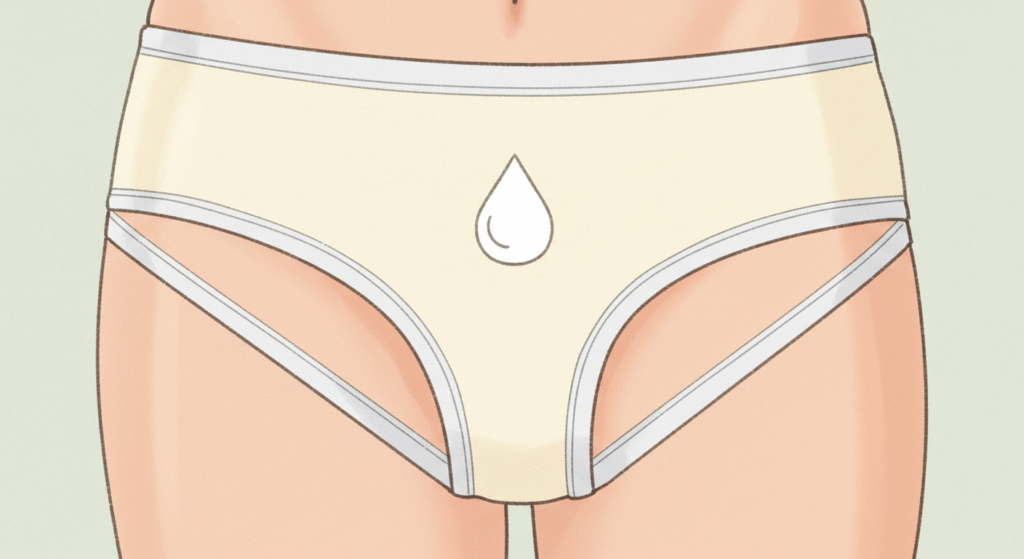
Finding white or milky discharge in your underwear might feel confusing or even embarrassing—but it’s actually a very normal and healthy sign that your period may be a few months away.
What It Is
This type of discharge is usually:
- White or off-white
- Creamy, slightly sticky, or lotion-like
- Mild in smell or odorless
- Not itchy or painful
If it matches the description above, it’s called physiological leukorrhea. It’s your body’s way of keeping your vagina clean, balanced, and ready for the changes coming with puberty.
Why It Happens
As estrogen levels increase in puberty, your reproductive system begins to prepare for ovulation (releasing an egg) and menstruation. Part of this preparation involves producing vaginal discharge.
This discharge helps:
- Keep your vagina clean and healthy
- Prevent infections
- Indicate rising estrogen levels
It’s not a problem to fix—it’s a sign that your body is working as it should.
Timeline
This type of discharge often begins 6 months to 1 year before your first period. Some girls might notice it earlier or later, but in many cases, this is one of the first physical signs that your menstrual cycle is developing.
If you start seeing this discharge regularly, it’s a strong signal that your period may arrive within the next year.
When to Be Concerned
Not all discharge is harmless. Watch out for these red flags:
- Yellow, green, or grey color
- Strong or foul odor
- Itching, burning, or irritation
These signs could point to an infection (like a yeast infection or bacterial vaginosis), and it’s a good idea to speak with a doctor if you notice them.
What to Do About It
- Wear Panty Liners If Needed
If the discharge feels uncomfortable or stains your underwear, you can wear light, unscented panty liners. Avoid scented products—they can irritate your skin and cause imbalances. - Don’t Try to Stop It
Vaginal discharge is a sign of health, not dirtiness. It doesn’t mean you need to scrub, douche, or use feminine hygiene sprays. These can cause more harm than good. - Track the Pattern
You might notice discharge becomes heavier on some days and lighter on others. This rhythm is part of your body slowly adjusting to a future monthly cycle.
Final Thought on Discharge
Thick white or creamy discharge is not something to feel embarrassed about. It’s a clear, healthy sign that your reproductive system is developing.
If you understand it and monitor it, you’ll feel much more confident and informed as your body moves toward its first period.
🎈 Sudden Bloating Without Eating More
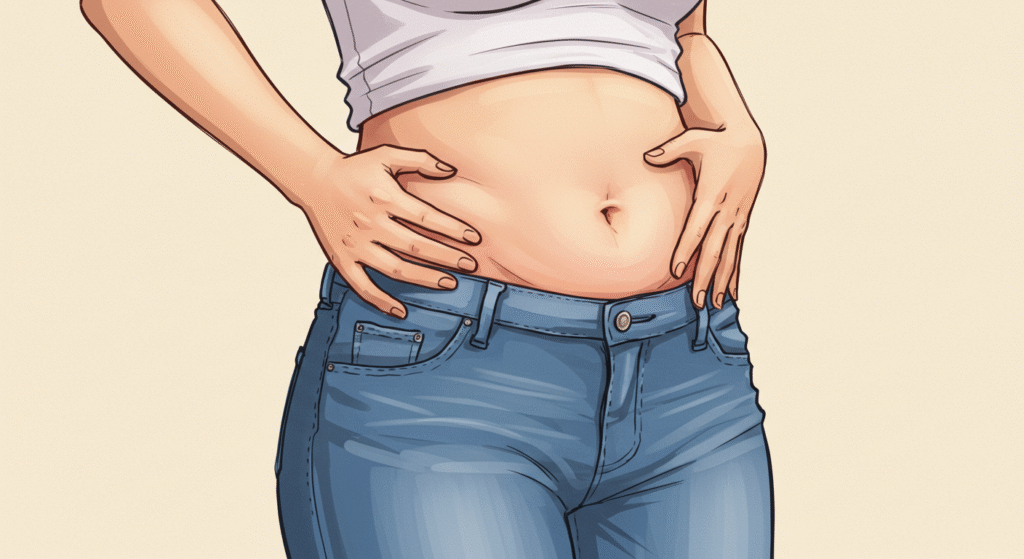
Have you ever noticed your pants suddenly feel tighter, or your lower belly looks puffier, even though you didn’t eat more or change your habits?
This uncomfortable swelling or bloating is a very common sign that your period could be approaching—even before it starts.
Why Does This Happen?
Bloating happens because of hormonal changes, mainly due to fluctuating levels of estrogen and progesterone. These hormones affect how your body holds onto water and salt.
Before your period:
- Your body tends to retain more water, making tissues swell.
- Your stomach and intestines might feel fuller or “gassy.”
- This causes your belly to look or feel puffed out.
Common Mistakes
Many girls assume they are gaining fat or eating something wrong. This can cause worry or frustration.
But bloating before your period is temporary and not fat gain. It will come and go in cycles and usually disappears once your period starts or shortly after.
What Helps?
- Drink More Water
It might sound strange, but drinking water helps flush out extra salt and fluids that cause bloating. - Avoid Salty Snacks
Foods high in salt encourage your body to hold onto water longer. - Light Exercise
Moving your body, like going for a walk, helps reduce water retention and improves digestion. - Wear Comfortable Clothes
Pants or skirts with stretchy waists can ease discomfort during bloated days.
When to Worry
Bloating is normal, but if it’s painful, lasts a long time, or comes with severe cramps, talk to a doctor to rule out other causes like digestive issues.
4. 🦵 Leg Aches or Soreness
Leg pain or soreness might seem unrelated to your period, but it’s actually a surprisingly common early sign, especially before your first one.
What It Feels Like
- A dull ache or heaviness in the thighs or knees.
- Sometimes sharp or restless sensations.
- Pain may come and go and often feels stronger before your bleed starts.
Why It Happens
Your uterus and legs share nerve pathways. When your uterus prepares for menstruation, it can send pain signals that are felt in the legs.
Also, blood flow and circulation shift during hormonal changes, sometimes causing muscles and joints in the legs to feel sore or tight.
What Girls Often Think
- “It’s just growing pains.”
- “I slept wrong.”
- “It must be exercise soreness.”
While those might sometimes be true, if leg aches come alongside other early period signs, it could be linked to your cycle starting soon.
What Helps
- Warm Baths: Heat relaxes muscles and improves blood flow.
- Stretching: Gentle stretches relieve tight muscles.
- Magnesium-Rich Foods: Foods like bananas, spinach, and dark chocolate can help reduce muscle soreness.
- Light Movement: Walking or yoga keeps circulation smooth.
If leg pain is severe or lasts long, check with a healthcare provider to exclude other causes.
5. 🔥 Breakouts in New Places (Especially Chin or Jawline)
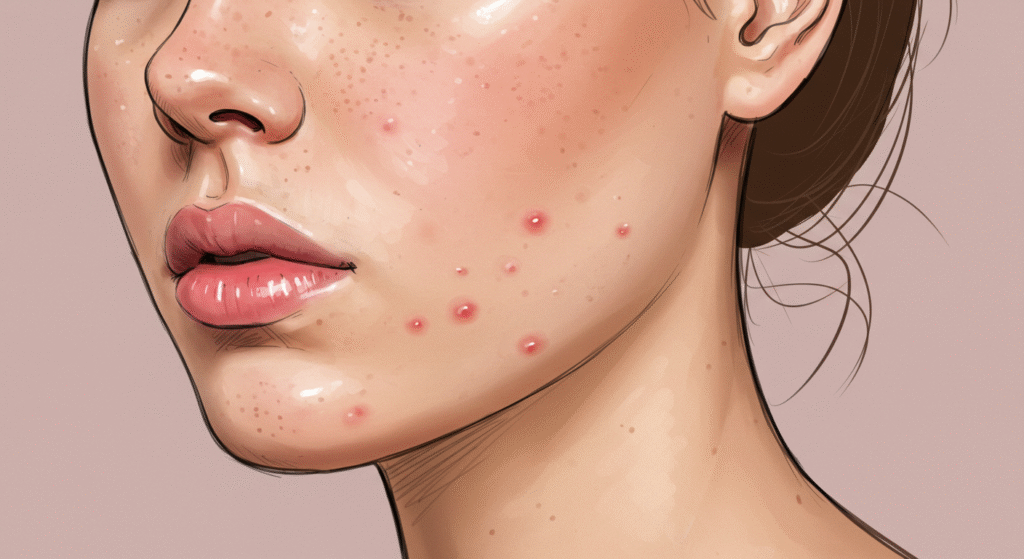
If you suddenly notice pimples popping up in new spots—especially around your chin, jawline, or sometimes on your chest and back—it could be a sign that your first period is on its way.
What’s Different From Teen Acne?
This isn’t just the regular pimples you might get from diet or sweat. These breakouts:
- Tend to be deeper, more painful, or cyst-like.
- Appear in the lower face area (chin and jawline).
- Come and go in cycles linked to your hormones.
Why Does It Happen?
Before menstruation, your body produces more androgens (male hormones present in all genders). These hormones:
- Stimulate oil glands in your skin.
- Cause the skin to produce more oil.
- Lead to clogged pores and breakouts.
Because this is a hormonal effect, it’s often one of the first visible signs that your period will start in a few weeks.
What to Do
- Don’t Over-Wash
Washing your face too much strips natural oils and can cause your skin to produce even more oil. - Use Gentle, Non-Comedogenic Products
Choose skincare labeled “non-comedogenic” (won’t clog pores). Look for gentle cleansers and light moisturizers. - Spot Treatments
Small amounts of tea tree oil or salicylic acid can help reduce pimples but use them sparingly to avoid drying your skin. - Avoid Picking or Squeezing
Picking can cause scarring and worsen inflammation.
When to See a Dermatologist
If breakouts are severe or painful, a skincare professional can help with tailored treatments.
😴 Unusual Tiredness (Even With Good Sleep)
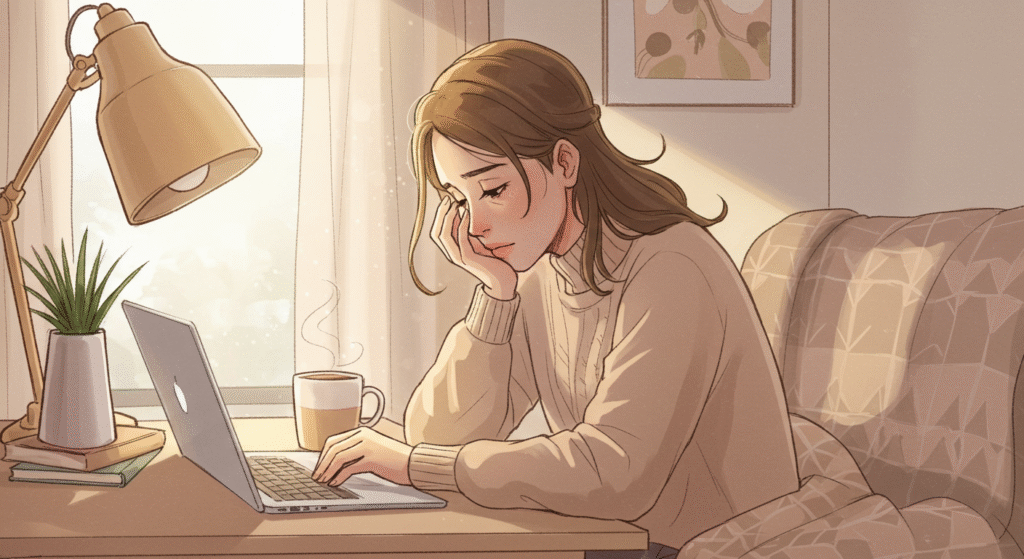
Feeling more tired or sluggish than usual, even if you’re sleeping well and haven’t changed your routine? This kind of unexplained tiredness can be an early sign your period is coming.
Why Does This Happen?
Hormones like estrogen and progesterone affect your brain chemicals and energy levels. Before your first period:
- Serotonin levels, which influence mood and energy, can dip.
- Your body might start to use more iron, or your iron levels may temporarily drop, causing fatigue.
- Blood sugar levels can fluctuate, leaving you feeling drained.
Common Misunderstandings
Many girls blame tiredness on being lazy, too much screen time, or poor diet—but if your routine hasn’t changed, these aren’t the main reasons.
It’s actually your body adjusting to hormonal shifts, which can temporarily zap your energy.
What Helps?
- Prioritize Rest: Try to stick to a regular sleep schedule and allow yourself rest days.
- Eat Iron-Rich Foods: Spinach, eggs, beans, and red meat can help prevent iron-related fatigue.
- Stay Hydrated: Dehydration worsens tiredness.
- Moderate Exercise: Gentle movement like walking can boost energy without exhaustion.
When to Consider Medical Advice
If tiredness gets worse or continues even after your period starts, a blood test might be helpful to check for anemia or other issues.
7. 👃 Super Sensitive to Smells or Food
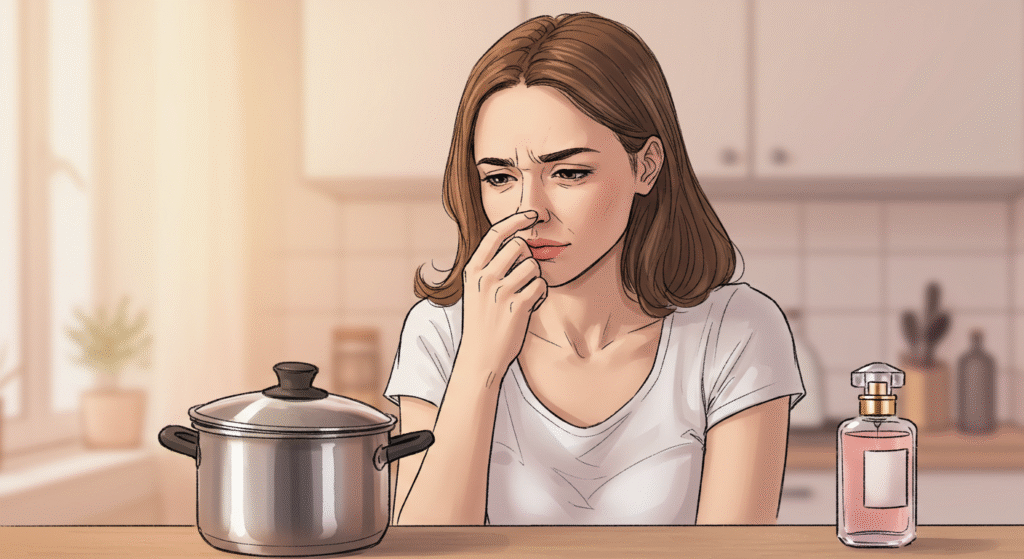
Sudden changes in your sense of smell or how certain foods make you feel? You might notice being more sensitive to smells, or developing cravings or aversions, just before your first period.
What’s Going On?
Hormones affect your olfactory system (sense of smell) and your digestive system in early puberty stages.
- You might find strong smells like perfumes, cooking aromas, or smoke overwhelming.
- Foods that were once fine may suddenly taste “off” or cause mild nausea.
- You might crave salty snacks or bland foods.
This is similar to some early pregnancy symptoms but usually less intense.
Why It Matters
These changes are subtle and often ignored, but they’re a real sign your body is shifting hormonally.
What Helps?
- Avoid Strong Smells: Stay away from perfumes or strong-smelling foods when you feel sensitive.
- Try Ginger or Mint: Ginger tea or mint gum can reduce nausea or upset stomach.
- Eat Simple, Bland Meals: Foods like toast, rice, or bananas are easier on your stomach during this phase.
When To Expect It To Pass
These sensitivities tend to improve once your period starts and your hormones stabilize
⏳ When to Expect the First Period
Most girls get their first period between ages 11 and 14, but it’s totally normal for it to come earlier or later, even up to 16 or 17 years old.
What Usually Happens First?
Your body shows signs of puberty gradually. Before your first bleed, you might notice:
- 2 to 4 of the signs described here, consistently appearing for a few months.
- Your breasts begin to develop.
- Pubic hair starts to grow.
- Vaginal discharge becomes noticeable.
What Will Your First Period Look Like?
- Often, the first period is light spotting or small amounts of blood, not heavy bleeding.
- It might last only a couple of days.
- Over time, your periods will become more regular and heavier as your cycle matures.
How to Be Prepared
- Start carrying pads or panty liners once you notice early signs.
- Use period tracking apps or keep notes on your body changes.
- Talk to a trusted adult if you’re confused or anxious.
When to See a Doctor
If you haven’t started your period by age 16 or 17, or you have no other puberty signs, it’s a good idea to check with a doctor. It’s usually nothing serious but worth ruling out any medical reasons.
Conclusion
The truth is, many early period signs don’t get talked about openly, even though they happen to most girls. If you’re feeling “off” with mood swings, tiredness, weird aches, or changes in your body, that’s often just your hormones quietly getting your body ready.
It’s normal to feel confused or overwhelmed by these changes. What matters most is knowing your body and trusting that these signs are part of growing up.
Start tracking your symptoms, listen to what your body tells you, and don’t hesitate to reach out to someone you trust or a doctor. You don’t have to navigate this alone.
I didn’t have all this info when I was younger, but now you do—and that’s powerful.
Feel free to share your experiences, ask questions, or find support from friends or online communities. Your journey is unique, but you’re definitely not alone.
